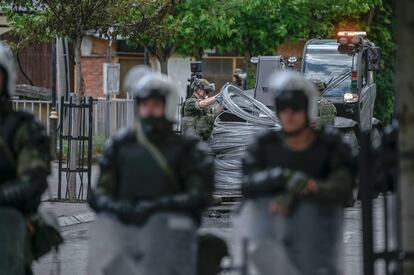Belgrade’s policies take a toll once again on Kosovo
The main problem is ensuring that the small Serb population that has not gone into exile, can live in safety and with dignity, which is currently not the case

The tragic story of the former Yugoslavia began in Kosovo. Now, as has happened in the past, the consequences of the mistaken, centralist and xenophobic policy of the Belgrade authorities towards this southern province, which declared itself independent in 2008, are once again taking a toll. What has happened in recent days may seem to follow a very simple script: Serbian President Aleksandar Vučić ordered alleged militants to be bussed in from Kosovo for a rally he was holding to counter the protests that have been sweeping through Belgrade for weeks. Why from Kosovo? Because the Serb population there is especially vulnerable. Many Kosovo Serbs still trust in official power to look after them.
In Belgrade, mass citizen protests have been calling for an end to the “Vučić era.” After a student in a downtown school killed nine classmates with his father’s gun, the public has risen up to demand a Serbia free of weapons, corruption and unhealthy nationalism. The Serbian president wanted to show at the rally that he was still loved by the people, but given the context of the protests, he couldn’t count on the population of the capital and its surroundings to do this. That’s why he didn’t mind once again using the people of Kosovo as guinea pigs. And while he brought them to be idolized in Belgrade, a group of pro-independence Albanian Kosovars used the opportunity to raise their flag in the few town halls in northern Kosovo still controlled by Serbs. This scenario has become more delicate and dangerous with each passing day and hour. In this area, it is not only difficult to deal with history, it is difficult to even explain it.
The Albanian independentist movement in Kosovo — which was born and has grown as a response to feeling like second-class citizens in the former Serbian province for decades — was a threat even during the Socialist Federal Republic of Yugoslavia. Back then, only the adjective “Yugoslav” was politically correct. When I was a girl, I remember that on end-of-year trips in primary school — where year after year I had to go to each of the capitals of the then-Yugoslav republics under the motto “know your homeland to love it more” — the only place where they did not let us get out of the bus was Pristina, the capital of Kosovo.
At night, drums were heard beating in front of the hostel near the Patriarchate of Peć Monastery, an Orthodox Christian complex built during the medieval period of “great” Serbia. None of the teachers dared to tell us that it could be Albanian Kosovars protesting the arrival of schoolkids from Belgrade, the capital of Serbia and, back then, all of Yugoslavia. In the 1970s, there was evident suspicion between Kosovo Albanians and Serbs. The area was already a powder keg. Although Yugoslavian leader Josip Broz Tito granted broad rights to Albanian Kosovars in the 1974 Constitution, it failed to counter the deep-running hatred of the oppressed population, which spanned many generations. Albanian Kosovars felt humiliated by the Slavic Serbs, who have always claimed Kosovo as the cradle of their culture.
Serbian leader Slobodan Milošević took advantage of the tensions in Kosovo to rise to power with his legendary phrase: “I will not let anyone attack the [Kosovo] Serbs.” The first thing he did was to end the autonomy with which the Albanian Kosovar population had started to run their local institutions, parallel to the Serbian ones. And the Albanian Kosovars, who were growing demographically, once again felt humiliated and hated. Wasn’t it to be expected? On the other hand, the Serbs who stayed in Kosovo had more and more reasons to leave: neighborhood hatred, war, lack of resources.
Kosovar’s fragile economy practically disappeared with the end of Yugoslavia, which allocated a considerable part of its budgets to the development of the southern province. This led to a rise in mafias and illegal trafficking of all kinds. And once again, the highest price was paid by the local population, both Albanian and Serbian. The demographic balance has been changing in the last decades: while the Albanian population has risen, the number of Serbs has fallen. Currently, they do not even account for 5% (in 1981, the figure was 20%). With Kosovo, the main issue is not whether it is permanently lost to Serbia or not, but ensuring that the small Serb population that has not gone into exile can live in security and with dignity, which is currently not the case.
Tu suscripción se está usando en otro dispositivo
¿Quieres añadir otro usuario a tu suscripción?
Si continúas leyendo en este dispositivo, no se podrá leer en el otro.
FlechaTu suscripción se está usando en otro dispositivo y solo puedes acceder a EL PAÍS desde un dispositivo a la vez.
Si quieres compartir tu cuenta, cambia tu suscripción a la modalidad Premium, así podrás añadir otro usuario. Cada uno accederá con su propia cuenta de email, lo que os permitirá personalizar vuestra experiencia en EL PAÍS.
¿Tienes una suscripción de empresa? Accede aquí para contratar más cuentas.
En el caso de no saber quién está usando tu cuenta, te recomendamos cambiar tu contraseña aquí.
Si decides continuar compartiendo tu cuenta, este mensaje se mostrará en tu dispositivo y en el de la otra persona que está usando tu cuenta de forma indefinida, afectando a tu experiencia de lectura. Puedes consultar aquí los términos y condiciones de la suscripción digital.








































